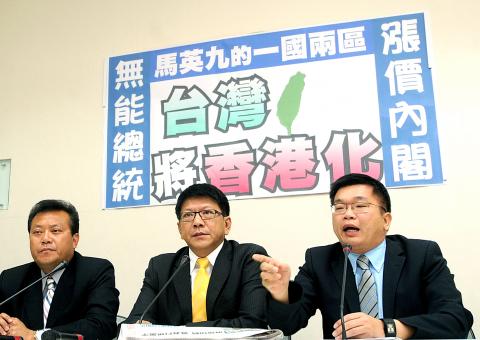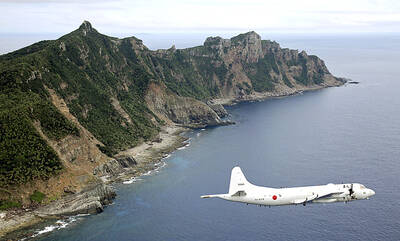President Ma Ying-jeou (馬英九) and the Chinese Nationalist Party (KMT) are reverting Taiwan to a single-party state with their ill-conceived proposal that cross-strait relations be conducted under the concept of “one country, two areas (一國兩區),” Democratic Progressive Party (DPP) lawmakers said yesterday.
Mainland Affairs Council Minister Lai Shin-yuan (賴幸媛) and National Security Bureau (NSB) Director-General Tsai Der-sheng (蔡得勝) said in the legislature yesterday that they were not consulted nor briefed on former KMT chairman Wu Poh-hsiung’s (吳伯雄) trip to Beijing, where Wu made the proposal to Chinese President Hu Jintao (胡錦濤) on Thursday.
“The controversy reflects a dysfunctional administration, with party officials making major political statements for the government,” DPP Legislator Tuan Yi-kang (段宜康) said.

Photo: Fang Pin-chao, Taipei Times
Ma, who Tuan said had -authorized Wu to make the proposal, also breached his pledge that he would consult the opposition on major national issues.
In response, Lai said Wu did not express a new position on cross-strait relations, since the proposal is in line with the Constitution and the Act Governing Relations Between the Peoples of the Taiwan Area and the Mainland Area (台灣地區與大陸地區人民關係條例).
While Lai said that the rhetoric of “one country, two areas” was an oversimplification of a complex initiative, she added that it did not signal Taiwan was ready to engage in political talks with China.
Tsai said there had been no official response from Beijing and he did not think it would address the proposal any time soon.
“I really don’t think the four-word initiative is that serious, since it was only a proposal,” Tsai said.
While it was “perhaps not a good time for the government to touch upon the sensitive issue,” Tsai said, any non-government initiative and discussion to explore possible solutions should be encouraged, because the development of bilateral relations should continue.
DPP Legislator Kuan Bi-ling (管碧玲) countered that the proposal ignored the Constitution and undermined the longstanding principle of “creative ambiguity” in Taiwan’s dealings with China.
The most dangerous implication in Wu’s remark was not the initiative, but his comment right after the proposal when he said that cross-strait relations were not a state-to-state relationship, but a special relationship, DPP Legislator Lin Chia-lung (林佳龍) said.
“Because that implied the Republic of China is extinct,” Lin said.
DPP Legislator Hsu Tain-tsair (許添財) questioned why Ma unilaterally decided to propose the initiative when there was no Chinese pressure.
“In my opinion, the move is not helpful to peaceful development across the [Taiwan] Strait anyway,” Hsu said.
DPP Legislator Pan Men-an (潘孟安) told a press conference earlier that the Act Governing Relations Between the Peoples of the Taiwan Area and the Mainland Area was enacted to deal with people-to-people exchanges and not the issue of Taiwan’s sovereignty.
KMT lawmakers also took shots at the Ma administration, with Chiang Chi-chen (江啟臣) questioning why it made such a proposal when it maintains that it would engage Beijing under the so-called “1992 consensus” and “one China with different interpretations.”
KMT Legislator Chi Kuo-tung (紀國棟) said the KMT was “looking for trouble” with the proposal, as all sovereignty-related disputes should be set aside for now because the “time is not right.”
Citing the Diaoyutai Islands (釣魚台) dispute as a reference, Chi said it does Taiwan no good to raise the issue with Japan right now.

MISINFORMATION: The generated content tends to adopt China’s official stance, such as ‘Taiwan is currently governed by the Chinese central government,’ the NSB said Five China-developed artificial intelligence (AI) language models exhibit cybersecurity risks and content biases, an inspection conducted by the National Security Bureau (NSB) showed. The five AI tools are: DeepSeek, Doubao (豆包), Yiyan (文心一言), Tongyi (通義千問) and Yuanbao (騰訊元寶), the bureau said, advising people to remain vigilant to protect personal data privacy and corporate business secrets. The NSB said it, in accordance with the National Intelligence Services Act (國家情報工作法), has reviewed international cybersecurity reports and intelligence, and coordinated with the Ministry of Justice Investigation Bureau and the National Police Agency’s Criminal Investigation Bureau to conduct an inspection of China-made AI language

LIMITS: While China increases military pressure on Taiwan and expands its use of cognitive warfare, it is unwilling to target tech supply chains, the report said US and Taiwan military officials have warned that the Chinese People’s Liberation Army (PLA) could implement a blockade within “a matter of hours” and need only “minimal conversion time” prior to an attack on Taiwan, a report released on Tuesday by the US Senate’s China Economic and Security Review Commission said. “While there is no indication that China is planning an imminent attack, the United States and its allies and partners can no longer assume that a Taiwan contingency is a distant possibility for which they would have ample time to prepare,” it said. The commission made the comments in its annual

‘TROUBLEMAKER’: Most countries believe that it is China — rather than Taiwan — that is undermining regional peace and stability with its coercive tactics, the president said China should restrain itself and refrain from being a troublemaker that sabotages peace and stability in the Indo-Pacific region, President William Lai (賴清德) said yesterday. Lai made the remarks after China Coast Guard vessels sailed into disputed waters off the Senkaku Islands — known as the Diaoyutai Islands (釣魚台) in Taiwan — following a remark Japanese Prime Minister Sanae Takaichi made regarding Taiwan. Takaichi during a parliamentary session on Nov. 7 said that a “Taiwan contingency” involving a Chinese naval blockade could qualify as a “survival-threatening situation” for Japan, and trigger Tokyo’s deployment of its military for defense. Asked about the escalating tensions

DISPUTE: A Chinese official prompted a formal protest from Tokyo by saying that ‘the dirty head that sticks itself out must be cut off,’ after Takaichi’s Taiwan remarks Four armed China Coast Guard vessels yesterday morning sailed through disputed waters controlled by Japan, amid a diplomatic spat following Japanese Prime Minister Sanae Takaichi’s comments on Taiwan. The four ships sailed around the Senkaku Islands — known as the Diaoyutai Islands (釣魚台) to Taiwan, and which Taiwan and China also claim — on Saturday before entering Japanese waters yesterday and left, the Japan Coast Guard said. The China Coast Guard said in a statement that it carried out a “rights enforcement patrol” through the waters and that it was a lawful operation. As of the end of last month,